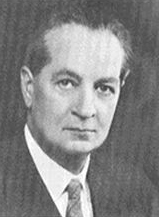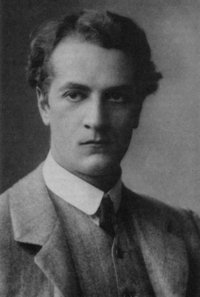<Back to Index>
- Social
Anthropologist Alfred
Reginald Radcliffe - Brown, 1881
PAGE SPONSOR


Alfred Reginald Radcliffe - Brown (born Alfred Reginald Brown, 17 January 1881 - 24 October 1955 in London) was an English social anthropologist who developed the theory of Structural Functionalism.
Radcliffe - Brown was born in Sparkbrook, Birmingham, England. After studying at Trinity College, Cambridge, he traveled to the Andaman Islands (1906 - 1908) and Western Australia (1910 - 1912, with biologist and writer E. L. Grant Watson and Daisy Bates) to conduct fieldwork into the workings of the societies there, serving as the inspiration for his later books The Andaman Islanders (1922) and The Social Organization of Australian Tribes (1930). However at the 1914 meeting of the British Association for the Advancement of Science, in Melbourne he was accused by Bates of plagiarizing her work.
In 1916 he became a director of education in Tonga, and in 1920 moved to Cape Town to become professor of social anthropology, founding the School of African Life. Further university appointments were University of Cape Town (1920 - 25), University of Sydney (1925 - 31) and University of Chicago (1931 - 37). Among his most prominent students during his years at the University of Chicago was Sol Tax and Fred Eggan. After these various far flung appointments, he finally returned to England in 1937 to take up an appointment to the first chair in social anthropology at Oxford in 1937, a post he held until his retirement in 1946.
While he founded the Institute of Social and Cultural Anthropology at Oxford, according to Rodney Needham his absence from the Institute during the war years prevented his theories and approach from having a major influence on Oxford anthropology.
He has been described as "the classic to Bronisław Malinowski's romantic". Radcliffe - Brown brought French sociology (namely Émile Durkheim) to British anthropology, constructing a rigorous battery of concepts to frame ethnography.
Greatly influenced by the work of Émile Durkheim, he saw institutions as the key to maintaining the global social order of a society, analogous to the organs of a body, and his studies of social function examine how customs aid in maintaining the overall stability of a society.
Radcliffe - Brown has often been associated with functionalism, and is considered by some to be the founder of structural functionalism. Nonetheless, Radcliffe - Brown vehemently denied being a functionalist, and carefully distinguished his concept of function from that of Malinowski, who openly advocated functionalism. While Malinowski's functionalism claimed that social practices could be directly explained by their ability to satisfy basic biological needs, Radcliffe - Brown rejected this as baseless. Instead, influenced by the process philosophy of Alfred North Whitehead, he claimed that the fundamental units of anthropology were processes of human life and interaction. Because these are by definition characterized by constant flux, what calls for explanation is the occurrence of stability. Why, Radcliffe - Brown asked, would some patterns of social practices repeat themselves and even seem to become fixed? He reasoned that this would at least require that other practices must not conflict with them too much; and that in some cases, it may be that practices grow to support each other, a notion he called 'coadaptation', deriving from the biological term. Functional analysis, then, was just the attempt to explain stability by discovering how practices fit together to sustain that stability; the 'function' of a practice was just its role in sustaining the overall social structure, insofar as there was a stable social structure (Radcliffe - Brown 1957). This is far from the 'functional explanation' later impugned by Carl Hempel and others. It is also clearly distinct from Malinowski's notion of function, a point which is often ignored by Radcliffe - Brown's detractors.
While Lévi - Strauss (1958) claimed that social structure and the social relations that are its constituents are theoretical constructions used to model social life, Radcliffe - Brown only half agreed. He argued (1957) that social relations are real, and even directly observable; but that social structure is a theoretical construction posited by the scientist on the basis of his or her observation of social relations.
He shared with Lévi - Strauss the notion that a major goal of social anthropology was to identify social structures and formal relationships between them, and that qualitative or discrete mathematics would be a necessary tool to do this. In that sense Radcliffe - Brown may be considered one of the fathers of social network analysis.
In addition to identifying abstract relationships between social structures, Radcliffe - Brown argued for the importance of the notion of a 'total social structure', which is the sum total of social relations in a given social unit of analysis during a given period. The identification of 'functions' of social practices was supposed to be relative to this total social structure.
Levis Strauss saw social structure as a model.
A popular view in the study of tribal societies had been that all societies follow a unilineal path ('evolutionism'), and that therefore 'primitive' societies could be understood as earlier stages along that path; conversely, 'modern' societies contained vestiges of older forms. Another view was that social practices tend to develop only once, and that therefore commonalities and differences between societies could be explained by a historical reconstruction of the interaction between societies ('diffusionism'). According to both of these views, the proper way to explain differences between tribal societies and modern ones was historical reconstruction.
Radcliffe - Brown rejected both of these views because of the untestable nature of historical reconstructions. Instead, he argued for the use of the comparative method to find regularities in human societies and thereby build up a genuinely scientific knowledge of social life.
To that end, Radcliffe - Brown argued for a 'natural science of society'. He claimed that there was an independent role for social anthropology here, separate from psychology, though not in conflict with it. This was because psychology was to be the study of individual mental processes, while social anthropology was to study processes of interaction between people (social relations). Thus he argued for a principled ontological distinction between psychology and social anthropology, in the same way as one might try to make a principled distinction between physics and biology. Moreover, he claimed that existing social scientific disciplines, with the possible exception of linguistics, were arbitrary and did not have any principled reason to exist; once our knowledge of society is sufficient, he argued, we will be able to form sub-disciplines of anthropology centered around relatively isolated parts of the social structure. But without extensive scientific knowledge, it is impossible to know where these boundaries will be drawn.
Radcliffe - Brown carried out extensive fieldwork in the Andaman Islands, Australia, and elsewhere. On the basis of this research, he contributed extensively to the anthropological ideas on kinship, and criticized Lévi - Strauss's Alliance theory. He also produced structural analyses of myths, including on the basis of the concept of binary distinctions, an idea later echoed by Lévi - Strauss.
Radcliffe - Brown was often criticized for failing to consider the effect of historical changes in the societies he studied, in particular changes brought about by colonialism, but he is now considered, together with Bronisław Malinowski, as the father of modern social anthropology.